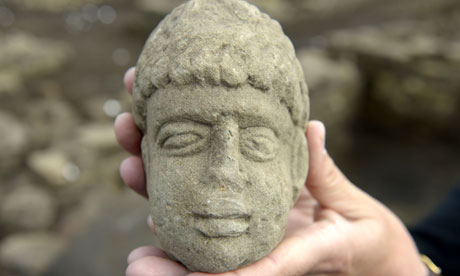
The Friday Digest brings you the best of the week's history news gathered from the experts:

* The site where the body of Richard III was found is being re-excavated in an attemot to find out more about the Church of the Greyfriars. Archaeologists are also planning to exhume a 600 year old coffin which is thought to contain the corpse of a medieval knight.
Public interest in Richard III remains high and Graham Turner's painting of Richard III at the Battle of Bosworth incorporates the latest information from the excavation earlier this year.

* A rare World War One Richard Verascope stereo camera previously owned by the French Army was bought at auction last year. The cameras was in pristine condition and included the original leather carrying case and glass slides. For the first time, you can see some extraordinary photographs of the First World War in 3D.
* Later this year Michael Palin will be starring in his first on-screen acting role on over two decades when he appears in a new BBC drama, 'The Wipers Times' which is based on the true story of a satirical newspaper that was produced by troops in the trenches.

* The 1,300-year-old Lindisfarne Gospels have gone on display in the north-east of England for three months in a major Durham University exhibition, offering audiences a rare chance to view them outside of the British Library.
Culture 24 recommend visiting the exhibition whilst it is on and have suggested some other historical and heritage highlights for July-ideal if you are looking for something to do this weekend...

* A museum in Sweden is digitising its mummy collection in 3D to allow visitors to 'unwrap' a mummy to 'find out more about the individual's sex, age, living conditions and beliefs'. I just hope that other museums can follow suit, imagine how brilliant school trips would be!

* A Roman shrine, thought to date to around 100 AD has been found at Rutland Water nature reserve. Archaeologists found a circular stone building and also more than 200 Roman coins, pottery jars, part of a small bronze figurine and deposits of animal bone, probably from the ritual sacrifice of lambs and cattle.

* An 1,800-year-old carved stone head of a possible Geordie Roman god has been discovered buried in an ancient rubbish dump at Bishop Auckland near County Durham.

* The history and folklore of a 'forgotten village' of the Peak District is to be highlighted in a permanent online archive. Stoney Middleton has been described as 'the most fascinating single village in Derbyshire' by project leader Colin Hall and despite its small size, has over 20 points of interest.

* In 1941, a number of troops descended on some of the most isolated beauty spots in Britain. To this day, many dangerous remnants are found by members of the public in some of the most idyllic locations across Great Britain.

* 5 famous literary hoaxes prove that lies are stranger than fiction...
* Simon Critchley shares 9 things that Hamlet can teach us.
* Just why is English spelling so bizarre?
* The 7 most popular stories from Publishing Perspectives in 2013 (So Far)
* To save the struggling high street, authors are urged to engage with their local bookshops.

* A skull found in Australia has challenged the view that Captain Cook was the first white person to set foot on the country’s east coast.

* For those who are unable to visit the Pompeii exhibition at The British Museum, this recording of a lecture where Mary Beard and best-selling author Robert Harris discuss the enduring appeal of the story of Pompeii should be an interesting alternative.

* We have discussed the delicately balanced relationship between accuracy and a good story before on the blog and the focus of 'television history' is an ongoing debate. Do you agree that there is too much focus on the Nazis and the Tudors on television?

* Nalanda University in northern India was a distinguished university long before Oxford, Cambridge or Bologna were first founded and it maintained its scholarly reputation up until its destruction by invaders in 1193. Now, the idea of re-establishing Nalanda as an international centre of learning has been proposed by a group of statesmen and scholars, led by Amartya Sen, a Nobel prize winning economist.
Can Nalanda compete with modern universities?

* Was James Buchanan really the worst US president?

* On 3 July 1938, an A4 class locomotive Mallard raced down Stoke Bank at 126mph to set a new steam locomotive world speed record. That record still stands today. To celebrate the anniversary of this remarkable achievement, the National Railway Museum in York arranged for the Mallard to meet its five surviving sister locomotives from the A4 class.
It is amazing to think that this record has managed to remain unbroken, despite steam trains being used into the 1960s!

* Finally, as Kate's due date draws ever closer, here's 10 curious things about the royal birth...
Which history and publishing stories have you enjoyed reading this week?